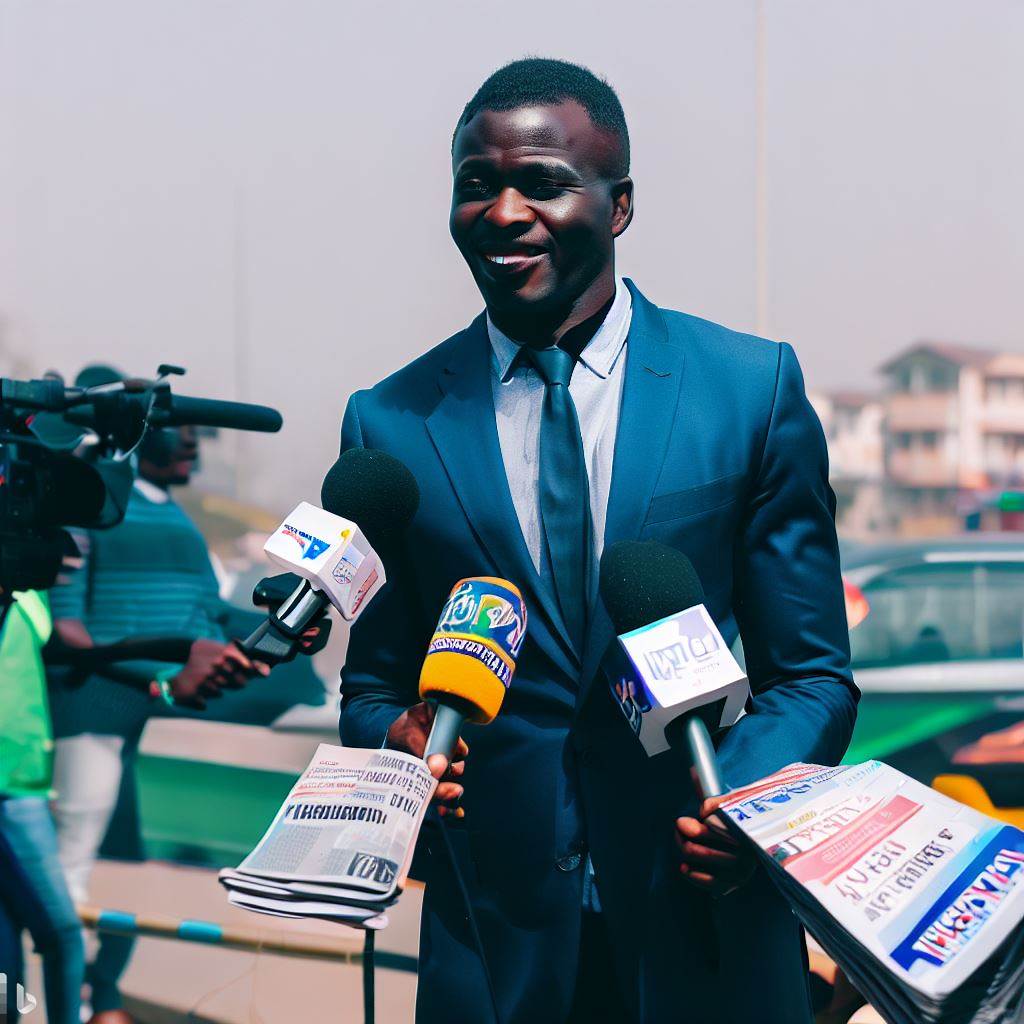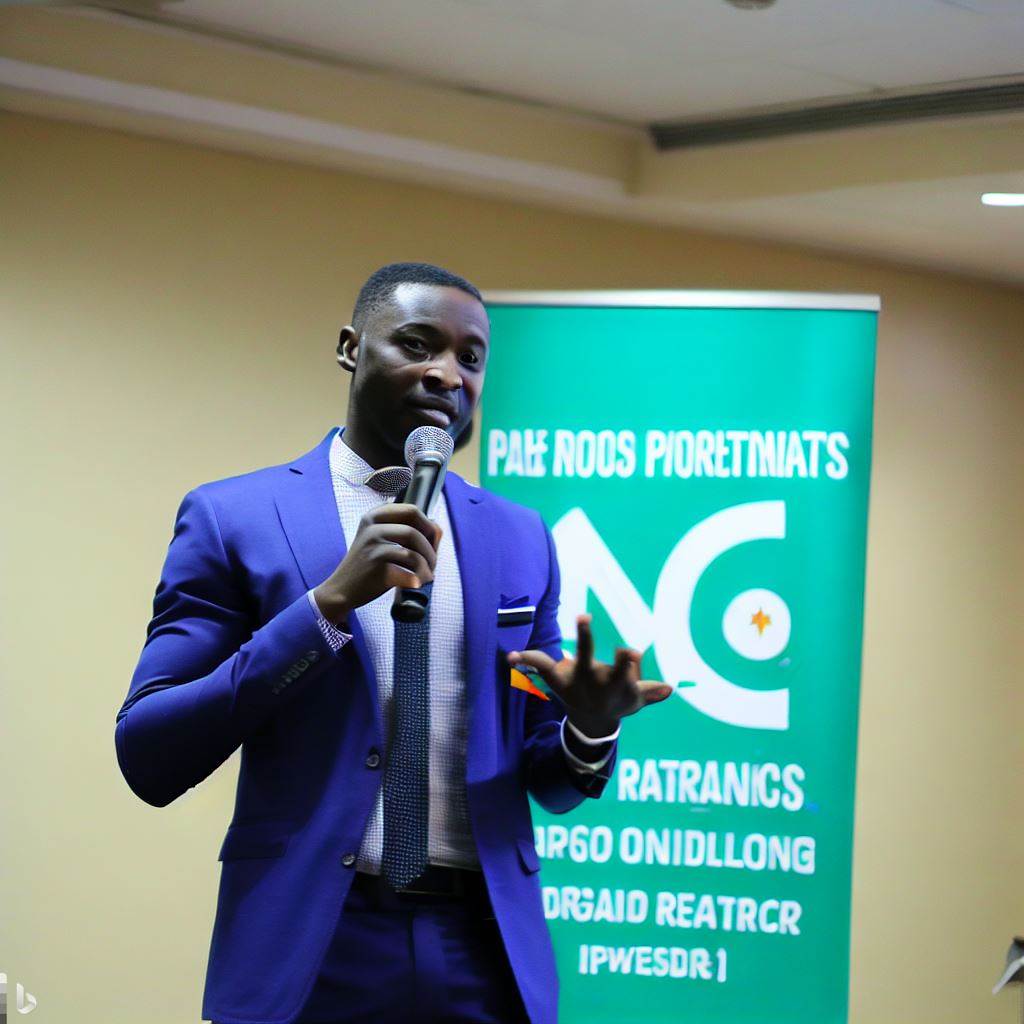Introduction
In the realm of Nigerian politics, the convergence of Public Relations (PR) takes center stage.
This synergy delves into the interplay between PR dynamics and the intricate political backdrop of Nigeria.
This article embarks on a journey to dissect this juncture, shedding light on how PR strategies intricately shape and mold the Nigerian political landscape.
The primary aim of this piece is to navigate through the profound influence of PR strategies on Nigerian politics.
By scrutinizing the strategic interplay between communication techniques and political maneuvers, we gain insights into the mechanisms that underpin the nation’s political discourse.
Most importantly, the “Intersection of PR and Nigerian Politics” encapsulates the symbiotic relationship between PR methodologies and the Nigerian political arena.
Through a focused exploration, we unravel the multifaceted ways in which PR strategies wield substantial sway over the course of politics in Nigeria.
Understanding PR in the Nigerian context
Define PR and its role in the political landscape
Public Relations (PR) is a strategic communication process that builds mutually beneficial relationships between organizations and their publics.
In the Nigerian context, PR plays a crucial role in the political landscape, where politicians and political parties use it to manage their image and shape public perception.
It involves managing communication between political actors and the public
- Politicians use PR to influence public opinion, gain support, and build trust.
- PR practitioners act as intermediaries, conveying messages on behalf of politicians to the public.
PR focuses on fostering positive relationships with various stakeholders in politics
- Politicians engage in PR activities to win the support of different interest groups.
- PR helps politicians maintain good relationships with the media, civil society, and voters.
PR helps shape public perception and maintain a favorable image
- Through PR, politicians strategically craft and disseminate messages to control their public image.
- Perception management is vital, as voters’ opinions are influenced by how politicians are portrayed.
Discuss the importance of effective PR strategies in Nigerian politics
Building Trust and Credibility
- Effective PR strategies help politicians develop trust and credibility among the public.
- By delivering consistent, transparent, and reliable messages, politicians can gain voters’ confidence.
Managing Crises
- In Nigerian politics, crises can damage politicians’ reputations and hinder their success.
- A well-executed PR strategy can mitigate the impact of crises and ensure politicians bounce back.
Influencing Public Opinion
- Nigerian politicians rely on PR to shape public opinion by presenting their policies and achievements effectively.
- Through strategic messaging, politicians can sway public sentiment in their favor.
Mobilizing Support and Building Coalitions
- PR strategies enable politicians to mobilize support and build alliances with other stakeholders.
- By effectively communicating their goals and plans, politicians can rally supporters and forge coalitions.
Engaging the Youth and New Voters
- Nigerian politics is heavily influenced by the youth demographic.
- PR strategies aim to engage and mobilize young voters by using platforms such as social media.
Differentiating from Competitors
- PR allows politicians to position themselves distinctively amidst competition.
- Through effective PR strategies, politicians can highlight their unique qualities and platforms.
In the end, in the Nigerian political landscape, PR plays a pivotal role in how politicians communicate with the public, shape public opinion, and maintain a favorable image.
Effective PR strategies are essential for politicians to build trust, manage crises, influence public opinion, mobilize support, engage the youth, and differentiate themselves from competitors.
Understanding and harnessing the power of PR is crucial for success in Nigerian politics.
Key players in Nigerian politics
Identify prominent politicians and political parties
- President Muhammadu Buhari – Buhari is the current president of Nigeria, representing the All Progressives Congress (APC) party.
- Atiku Abubakar – Abubakar is a former vice president of Nigeria and a member of the People’s Democratic Party (PDP).
- Bola Ahmed Tinubu – Tinubu is a prominent politician and the national leader of APC. He played a key role in Buhari’s presidential victory in 2015.
- Goodluck Jonathan – Jonathan served as the president of Nigeria from 2010 to 2015 and is a member of the PDP.
- Nyesom Wike – Wike is a governor of Rivers State and a member of the PDP. He is known for his strong grassroots politics.
Discuss the PR tactics used by politicians and political parties
- Slogan creation and repetition: Political parties in Nigeria often come up with catchy slogans that resonate with the voters and continuously repeat them during campaigns.
- Community mobilization: Politicians focus on mobilizing support by reaching out to various communities and engaging in activities that directly benefit them.
- Mass media campaigns: Parties and candidates utilize television, radio, and social media platforms to broadcast their messages and promote their agendas.
- Public rallies and speeches: Politicians hold public rallies and deliver speeches to gather support and create a sense of enthusiasm among their followers.
- Endorsements and alliances: Political parties try to boost their credibility by seeking endorsements from influential individuals or forming alliances with other parties.
- Door-to-door campaigns: Candidates and party members actively visit households to directly interact with voters, understand their needs, and gain their trust.
- Social media presence: Politicians recognize the power of social media in shaping public opinion and use platforms like Facebook and Twitter to connect with voters.
- Utilizing traditional media outlets: Newspapers, magazines, and radio stations are still popular in Nigeria, and politicians take advantage of these outlets to reach a broader audience.
- Ethnic and religious affiliations: Nigeria has a diverse population, and politicians often exploit ethnic and religious affiliations to gain support from specific groups.
- Promising reforms and development: Candidates highlight their plans for improving infrastructure, education, healthcare, and other crucial areas to gain the trust of voters.
In short, Nigerian politics involves various key players, including prominent politicians and political parties.
These players employ various PR tactics such as slogan creation, community mobilization, mass media campaigns, public rallies, endorsements, door-to-door campaigns, social media presence, traditional media utilization, ethnic and religious affiliations, and promising reforms and development.
By understanding these tactics, we can better analyze the intersection of PR and Nigerian politics.
Role of media in shaping Nigerian politics
Discuss the influence of traditional media on public opinion
Traditional media plays a significant role in shaping public opinion in Nigerian politics.
- Greater integration of digital platforms like social media and online advertising will shape PR strategies.
- Utilizing data analytics and research to inform PR campaigns will become more important.
- Interactive and engaging content such as videos and infographics will be increasingly used to capture attention.
- Collaborations with influencers and opinion leaders will gain prominence in PR activities.
- Personalization of messages and targeted outreach to specific voter segments will be prioritized.
Highlight the impact of social media platforms in Nigerian politics
Social media platforms have revolutionized Nigerian politics, influencing public opinion and political discourse.
- Social media enables citizens to actively participate in discussions and share their views on political matters.
- Politicians and parties use social media to directly engage with voters and promote their agendas.
- Information spreads rapidly on platforms like Twitter, Facebook, and Instagram, reaching a wider audience.
- Social media allows for real-time reporting of political events, giving citizens access to up-to-date information.
- Online campaigns and hashtag movements have mobilized Nigerian youth, amplifying their political voice.
- Social media exposes political scandals and holds politicians accountable for their actions.
- However, the spread of fake news and misinformation on social media poses challenges to democratic processes.
- Political propaganda, hate speech, and divisive rhetoric can also thrive on these platforms.
In fact, the media, both traditional and social, play critical roles in shaping Nigerian politics.
Traditional media, such as newspapers, television, and radio, have historically influenced public opinion through news articles, analysis, debates, and endorsements.
However, the rise of social media platforms has significantly impacted political discourse in Nigeria.
Social media provides a platform for direct citizen participation, information sharing, and political mobilization.
It has allowed for real-time reporting of events, exposed political scandals, and empowered Nigerian youth.
However, the spread of fake news and divisive rhetoric on social media poses challenges to democratic processes.
In review, the media landscape continues to evolve, and it is essential to critically assess the influence and impact of both traditional and social media in Nigerian politics.
Read: PR Specialist: Combining Tradition and Innovation in Nigeria

PR challenges and strategies in Nigerian politics
Address the challenges faced by PR professionals in the political sphere
In Nigerian politics, PR professionals face several challenges while executing their roles.
Firstly, the political sphere is characterized by a high level of mistrust, making it difficult for PR professionals to build credibility.
Secondly, political parties often have diverse interests, and maintaining a consistent PR message becomes a challenge.
Thirdly, the media landscape is fragmented, with multiple channels and a lack of regulation, making it hard to control the narrative.
Moreover, there is a prevalence of fake news and misinformation, which PR professionals must actively combat.
Additionally, strong ethnic and regional divisions in Nigerian politics make it challenging to create unified PR strategies.
Furthermore, the influence of money and corruption can undermine the credibility and effectiveness of PR efforts.
To overcome these challenges, PR professionals in Nigerian politics need to employ certain strategies.
They must focus on building strong relationships and networks with key stakeholders to enhance credibility.
It is crucial for PR professionals to develop a clear and consistent PR message that aligns with the interests of various political parties.
Effective media monitoring and engagement are vital to navigate the fragmented media landscape and shape the narrative.
PR professionals should actively debunk fake news and provide accurate information through campaigns and fact-checking.
To address ethnic and regional divisions, PR strategies should be tailored to resonate with different cultural groups.
PR professionals must uphold ethical standards and transparency to mitigate the influence of money and corruption.
Provide examples of successful PR strategies implemented in Nigerian politics
Despite the challenges, there have been successful PR strategies implemented in Nigerian politics.
During the 2015 presidential election, Muhammadu Buhari’s campaign effectively utilized PR to create a persona of integrity and anti-corruption.
By emphasizing Buhari’s track record and portraying him as a man of the people, they appealed to voters across diverse regions.
Additionally, social media played a crucial role as PR professionals leveraged platforms like Twitter and Facebook to engage with voters.
Another example is the PR strategy employed by Goodluck Jonathan’s administration regarding the response to the Ebola outbreak in 2014.
Through effective crisis communication and public awareness campaigns, the government mitigated panic and misinformation.
They engaged with the media to provide regular updates, implemented preventive measures, and coordinated international assistance.
The successful containment of the outbreak was attributed in part to the PR efforts in disseminating accurate information.
In recent years, PR strategies have also been employed by advocacy groups and civil society organizations to push for positive political change.
For instance, the #EndSARS movement in 2020 utilized social media to raise awareness about police brutality and demand reform.
By organizing protests, sharing personal stories, and circulating campaign materials, they achieved widespread national and international attention.
These examples demonstrate the power of effective PR strategies in Nigerian politics, overcoming challenges and driving desired outcomes.
Overall, PR professionals in Nigerian politics face unique challenges, but with strategic planning and engagement, they can make significant impact.
By embracing transparency, fostering credibility, and adapting to the evolving media landscape, PR professionals can shape the narrative and influence political discourse.
Read: The Challenges and Triumphs of Make-up Artists in Nigeria
Public perception and trust in Nigerian politics
Discuss the role of PR in shaping public perception
Public relations (PR) plays a crucial role in shaping the public perception of Nigerian politics.
Through strategic messaging and communication, PR professionals aim to influence public opinion.
They use various media channels to disseminate information and create a favorable image for politicians.
PR experts carefully craft narratives, highlighting accomplishments and downplaying controversies.
The goal is to shape the narrative in a way that aligns with the interests of politicians and their parties.
PR strategies include media relations, social media campaigns, and public events to create positive associations.
By controlling the narrative, PR professionals attempt to shape public perception in favor of their clients.
However, PR has its limits, as public perception is also influenced by personal experiences and external factors.
Examine the importance of building trust between politicians and the public
The intersection of PR and Nigerian politics is vital for fostering trust between politicians and the public, a cornerstone for stability and legitimacy.
Trust forms the bedrock of a robust democracy and is imperative for competent governance. When politicians are trusted, citizen participation and backing for government endeavors increase.
Trust drives voter turnout, election involvement, and political accountability. Disregarding trust can erode Nigeria’s democratic foundation through skepticism and disinterest.
Trust emerges from consistent, transparent communication by politicians. The public anticipates honesty, integrity, and genuineness from their leaders.
Responsiveness to constituents’ concerns and prioritizing public welfare over personal gain are paramount.
Regular public dialogue and feedback-seeking also breed trust. Addressing citizen concerns and fulfilling promises are essential.
Transparency in decisions and action accountability are vital for trust. Trustworthy politicians garner public support and cooperation.
Trust, once shattered, is arduous to restore, underscoring its centrality in Nigerian politics. By nurturing trust, politicians can surmount challenges and steer positive change.
The synergy of PR and Nigerian politics molds public perception. Beyond strategic communication, trust-building stands as a linchpin.
Fostering trust is pivotal, upholding stability, citizen involvement, and effective governance. Transparency, accountability, and responsiveness fortify trust, coupled with promise fulfillment.
By prioritizing trust, politicians can navigate hurdles and propel Nigeria forward.
Read: Interviews with Top PR Specialists in Nigeria
See Related Content: Mixing Engineer vs. Mastering Engineer: Roles in Nigeria’s Music
Case studies: PR campaigns in Nigerian politics
Analyze successful PR campaigns from previous elections
- In 2015, Muhammadu Buhari utilized a well-structured PR campaign that focused on anti-corruption as a key message.
- Goodluck Jonathan’s PR campaign in 2011 utilized social media platforms effectively to engage with the youth population.
- Obafemi Awolowo’s PR campaign in 1979 successfully positioned him as the champion of the common man through grassroots mobilization.
- Olusegun Obasanjo’s PR campaign in 1999 emphasized his experience and military background, projecting him as a strong leader.
- These successful PR campaigns effectively captured the attention of the Nigerian electorate and influenced their voting decisions.
Examine the impact of these campaigns on the outcome of elections
- The 2015 PR campaign positioned Muhammadu Buhari as the candidate of change, contributing to his victory over the incumbent.
- Goodluck Jonathan’s use of social media in 2011 helped him connect with the tech-savvy youth, generating significant support.
- Obafemi Awolowo’s grassroots mobilization in 1979 helped him secure votes from the common people, ultimately boosting his chances.
- Olusegun Obasanjo’s portrayal as a strong leader in 1999 resonated with the electorate and played a pivotal role in his success.
- The impact of these PR campaigns was evident in the election outcomes, as they swayed public opinion and shaped the political landscape.
The Intersection of PR and Nigerian Politics becomes evident through the analysis of impactful PR campaigns during previous elections.
These case studies underscore the potency of well-executed PR strategies in shaping electoral results.
In 2015, Muhammadu Buhari’s campaign spotlighted corruption, resonating with voters seeking change.
Strategic messaging positioned him as an anti-corruption champion, leading to victory over the incumbent.
Similarly, Goodluck Jonathan’s 2011 campaign leveraged social media, engaging Nigerian youth on platforms like Twitter and Facebook.
This tech-savvy approach garnered significant support, enhancing his election prospects.
In 1979, Obafemi Awolowo’s grassroots campaign resonated. Focusing on local connections, he positioned as the people’s champion, securing their votes and improving his prospects.
In 1999, Olusegun Obasanjo emphasized his experience and military background, projecting strength during transition and inspiring voter confidence.
These PR successes undeniably impacted election outcomes. Strategic communication captured voter attention, shaping choices and giving candidates an edge.
These case studies vividly underscore PR’s vital role in Nigerian politics. They highlight the power of strategic messaging, grassroots engagement, and adept social media use in influencing elections.
As Nigeria’s political landscape evolves, these lessons guide future candidates and parties.
Read: The Role of PR in Nigeria’s Corporate World
Publish Your Professional Profile, Business or Brand
Showcase your expertise, gain trust, and boost visibility instantly on Professions.ng.
Publish NowThe future of PR in Nigerian politics
Discuss potential advancements and changes in PR strategies
- Greater integration of digital platforms like social media and online advertising will shape PR strategies.
- Utilizing data analytics and research to inform PR campaigns will become more important.
- Interactive and engaging content such as videos and infographics will be increasingly used to capture attention.
- Collaborations with influencers and opinion leaders will gain prominence in PR activities.
- Personalization of messages and targeted outreach to specific voter segments will be prioritized.
Provide recommendations for effective PR practices in Nigerian politics
- Embrace digital transformation by investing in skilled digital PR specialists and technology.
- Conduct extensive research to understand the evolving needs and attitudes of Nigerian voters.
- Develop compelling narratives that resonate with voters and highlight a candidate’s credibility.
- Establish a strong social media presence and engage with voters on various platforms.
- Leverage the power of storytelling to create emotional connections and positive associations.
- Foster transparency and provide accurate information to build public trust and credibility.
- Monitor online conversations and adjust PR strategies accordingly to effectively respond to criticisms or misinformation.
- Collaborate with influencers, celebrities, and grassroots organizations to expand reach and credibility.
- Utilize data analytics to track the impact of PR efforts and refine strategies for maximum effectiveness.
- Train political candidates and parties on media relations and effective communication techniques.
- Build strategic partnerships with media outlets to ensure fair and balanced coverage of political campaigns.
- Engage in community outreach programs to build relationships and understand local concerns.
- Consistently evaluate PR strategies and adapt them to changing political landscapes and societal trends.
- Foster a culture of ethical PR practices that prioritize accuracy, integrity, and responsible communication.
- Foster an environment that encourages dialogue and feedback, allowing the public to actively participate in the political process.
In essence, the future of PR in Nigerian politics holds great potential for advancements and changes in strategies.
The integration of digital platforms, personalized messages, and collaborations with influencers will shape the landscape.
To ensure effective PR practices, investments in digital expertise, research, compelling narratives, social media engagement, and transparency are essential.
It is crucial to leverage data analytics, monitor online conversations, and adapt strategies to maximize impact.
By embracing these recommendations, PR professionals can contribute to a positive and informed political discourse in Nigeria.
Conclusion
Exploring the dynamic interplay of PR and Nigerian politics, we unveil the pivotal role PR practitioners assume in shaping the nation’s political landscape.
Effective PR strategies wield considerable power, molding public sentiment, architecting political campaigns, and safeguarding politicians’ reputations.
Navigating the intricate Nigerian political terrain poses challenges for PR professionals, yet its import remains undeniable.
PR’s potential for constructive transformation shines through its capacity to institute transparency, accountability, and ethical conduct in politics.
This juncture critically advances democratic ideals and cultivates a robust political milieu. Additionally, this synergy augments global relations and beckons foreign investments.
As Nigeria’s political evolution continues, the nexus of PR and politics gains amplified significance.
Collaborative efforts between PR experts and politicians hold the key to harnessing PR’s potency in influencing public sentiment and discourse.
A symbiotic utilization of PR stands poised to serve both objectives and the Nigerian populace.
The dynamic Intersection of PR and Nigerian Politics is a realm of immense promise, primed to catalyze positive metamorphosis.




